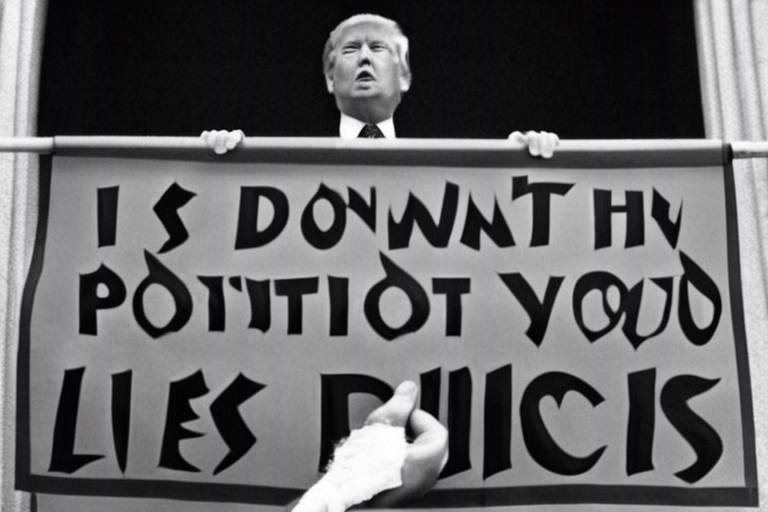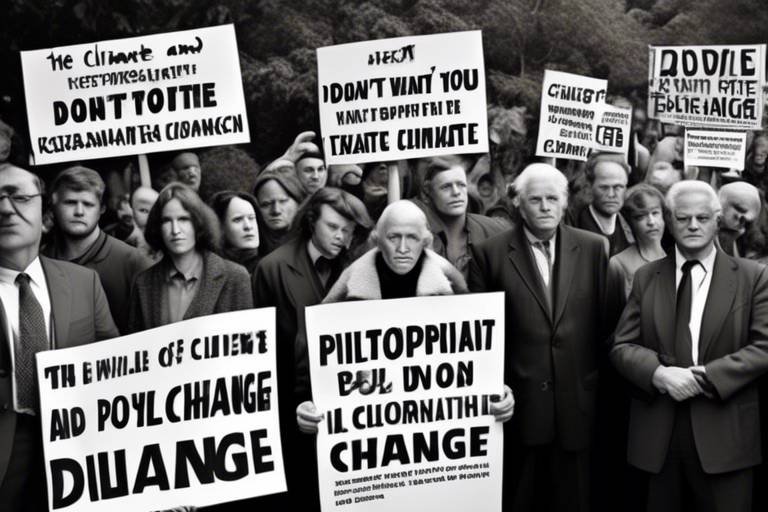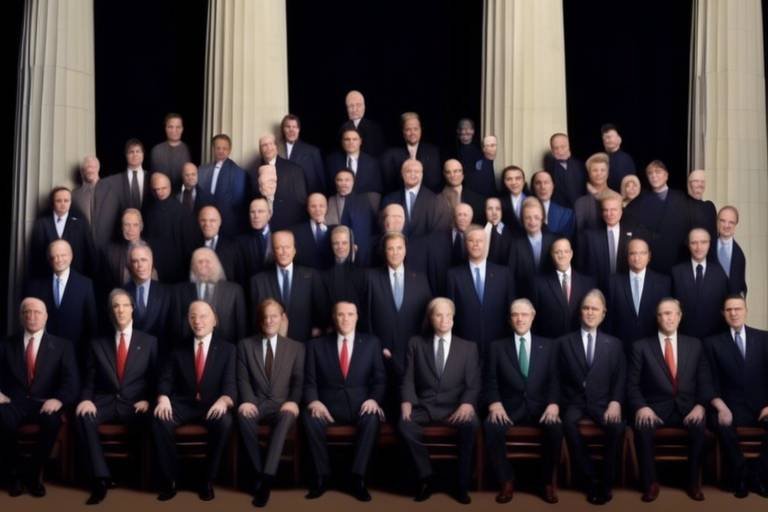The Philosophy of Populist Politics
Populist politics is like a rollercoaster ride through the ups and downs of society, governance, and political discourse. It’s a phenomenon that has captivated the public's imagination and stirred deep emotions. At its core, populism is about the **struggle between the common people** and the elites, often framed as a battle for justice, equality, and representation. But what does this really mean? In essence, populism taps into the frustrations of everyday individuals, promising to amplify their voices and address their grievances. This article delves into the fundamental principles and ideologies behind populist politics, exploring its impact on modern society and the way we engage with politics today.
To truly understand populism, we must first dig into its historical origins. Populism doesn’t just pop up overnight; it emerges from a rich tapestry of socio-economic conditions that have been brewing over time. Historically, it has risen during periods of crisis—economic downturns, social upheaval, or political corruption. Think of it as a pressure cooker: when the heat rises and the pressure builds, something has to give. Populism often fills the void left by traditional political parties that fail to address the needs of the people. This is why it has gained traction in various forms across different cultures and eras, adapting to the unique challenges faced by each society.
Populist movements often share several key characteristics that define their approach and goals. One of the most prominent traits is **anti-elitism**, which positions the movement against established political and economic elites. This sentiment resonates deeply with those who feel marginalized or ignored by the powers that be. Charismatic leadership is another hallmark of populism; leaders often emerge as larger-than-life figures who can connect with the public on a personal level. They possess the ability to articulate the frustrations of the masses and rally them around a common cause. Additionally, populist movements focus heavily on the **common people**, emphasizing their struggles and aspirations as central to the movement's narrative.
Charismatic leaders are the rock stars of populist movements. They possess a magnetic personality that draws followers in, often embodying the values and ideals of the movement itself. These leaders are skilled communicators, using persuasive rhetoric to mobilize public sentiment. Their speeches are often filled with powerful imagery and emotional appeals that resonate deeply with their audience. It’s like watching a masterful storyteller weave a tale that captivates and inspires. However, this reliance on individual leaders can also lead to volatility; when the leader falters or loses popularity, the movement can quickly lose momentum.
The relationship between populism and nationalism is significant and complex. Populist leaders frequently invoke national identity to unify their supporters, framing their agenda as a defense against perceived external threats. This can create a sense of belonging among followers, as they rally around a shared vision of their nation. However, it can also foster division, as the rhetoric often pits "us" against "them." This **nationalistic fervor** can lead to policies that prioritize the interests of certain groups over others, raising questions about inclusivity and equity.
In today's world, the rise of social media has revolutionized how populist movements communicate and engage with their constituents. It's like giving a megaphone to every citizen, allowing ideas to spread rapidly and reach a vast audience. This digital landscape enables grassroots mobilization, empowering individuals to share their stories and grievances. However, it also poses challenges, as misinformation can spread just as quickly, complicating the political discourse. The ability to connect directly with followers can bolster a populist leader's influence, but it also raises concerns about the quality and accuracy of the information being shared.
Economic discontent is often the fuel that drives individuals toward populist ideologies. Issues such as **income inequality**, job insecurity, and lack of access to basic services create fertile ground for populist rhetoric. When people feel left behind by the system, they are more likely to embrace movements that promise to address their grievances directly. Populism often presents itself as a solution, offering simple answers to complex problems. This appeal to economic frustrations is a powerful motivator, as it resonates with the everyday experiences of many individuals.
Populism has a dual nature when it comes to democracy; it can both challenge and reinforce democratic institutions. On one hand, populist movements can invigorate political participation, giving voice to those who feel disenfranchised. On the other hand, they can undermine the rule of law and create tensions between popular sovereignty and democratic norms. This dynamic reshapes the political landscape, leading to a reevaluation of what it means to be a democratic society.
One of the most concerning impacts of populism is its tendency to exacerbate political polarization. The **us versus them** mentality can deepen divides within society, making it increasingly difficult to engage in constructive dialogue. This polarization can lead to a breakdown in social cohesion, as individuals retreat into echo chambers that reinforce their beliefs. The challenge then becomes finding common ground in a landscape where differences are magnified, and compromise seems elusive.
To fully grasp the nuances of populism, it’s essential to analyze specific case studies of prominent populist leaders. Each leader's journey offers valuable insights into the diverse manifestations of populism around the globe. By examining their strategies, successes, and failures, we can better understand the complex interplay between populism and the political landscape. This analysis reveals not only the challenges faced by populist movements but also the potential for transformation within democratic systems.
- What is populism? Populism is a political approach that seeks to represent the interests of ordinary people against the elite.
- How does populism affect democracy? Populism can both invigorate and challenge democratic institutions, leading to potential conflicts between popular will and established norms.
- What role does social media play in populism? Social media allows populist movements to communicate directly with supporters, facilitating rapid idea dissemination and grassroots mobilization.

The Roots of Populism
Understanding the historical origins of populism is like peeling back the layers of an onion; each layer reveals the socio-economic conditions that have shaped its emergence in modern political landscapes. Populism is not a new phenomenon; it has roots that stretch back to various movements throughout history, often arising in response to social injustices, economic disparities, and political disenfranchisement. These movements have found fertile ground in times of crisis, where the common people feel that their voices are lost in the cacophony of elite governance.
Historically, populism has often flourished during periods of economic turmoil, such as the Great Depression or the 2008 financial crisis. In these moments, the gap between the wealthy and the poor widens, leading to a sense of frustration among the populace. This discontentment is a crucial ingredient for the rise of populist leaders who promise to be the voice of the voiceless. They often frame their narratives around a struggle between the "elite" and the "ordinary people," creating an us versus them mentality that resonates deeply with their supporters.
Moreover, the socio-political context cannot be ignored. In many cases, populism has emerged as a reaction to globalization, where local communities feel threatened by external forces that undermine their cultural identity and economic stability. The rise of multinational corporations and the decline of traditional industries have left many feeling vulnerable and disconnected, which populist leaders exploit by promising to restore national pride and protect local jobs.
To illustrate this point, consider the following table that outlines key historical events that have contributed to the rise of populist movements across different regions:
| Year | Event | Region | Impact |
|---|---|---|---|
| 1890s | Populist Party in the U.S. | North America | Advocated for farmers' rights and economic reforms. |
| 1930s | Rise of Fascism | Europe | Exploited economic despair and nationalist sentiments. |
| 2000s | Chávez in Venezuela | South America | Promised to uplift the poor and redistribute wealth. |
| 2010s | Brexit Vote | Europe | Reaction against immigration and EU regulations. |
In essence, the roots of populism are deeply embedded in the socio-economic fabric of society. They reflect the struggles of those who feel marginalized and unheard. By examining these roots, we can better understand the motivations behind populist movements and their appeal to the masses. The challenge lies in addressing the underlying issues that give rise to such movements while fostering a political environment that encourages dialogue and inclusivity, rather than division.
- What is populism? Populism is a political approach that seeks to represent the interests of ordinary people, often against a perceived elite or establishment.
- How does populism affect democracy? Populism can both challenge and reinforce democratic institutions, leading to tensions between popular sovereignty and the rule of law.
- What are some examples of populist leaders? Notable populist leaders include Hugo Chávez in Venezuela, Donald Trump in the United States, and Marine Le Pen in France.
- Why do populist movements arise? They often arise in response to economic discontent, social injustices, and a feeling of disenfranchisement among the populace.

Populist movements, regardless of their geographical location or ideological leanings, often share a set of defining characteristics that make them unique and impactful in the political arena. At the heart of populism lies a deep-seated anti-elitism, where populist leaders position themselves as champions of the common people against a corrupt or out-of-touch elite. This sentiment resonates particularly well in times of economic distress or social upheaval, as it taps into the frustrations and aspirations of the masses. The rhetoric employed by these leaders often emphasizes a stark division between "the people" and "the elite," creating a narrative that is both compelling and emotionally charged.
Another significant characteristic of populist movements is the presence of charismatic leadership. These leaders possess the ability to connect with their audience on a personal level, often through passionate speeches and relatable anecdotes. They become the face of the movement, embodying its values and aspirations. Think of figures like Donald Trump in the United States or Jair Bolsonaro in Brazil; their larger-than-life personas and ability to communicate directly with supporters—especially through social media—have played a crucial role in their political success. This charisma not only mobilizes people but also fosters a sense of loyalty that can be difficult to shake.
Moreover, populist movements typically focus on the common people, often elevating their struggles and concerns to the forefront of political discourse. This focus can manifest in various ways, such as advocating for policies that promise to address income inequality, job security, and social justice. For instance, many populist leaders promise to restore power to the people by dismantling bureaucratic systems that they argue have been captured by elites. This promise of empowerment is appealing to many who feel marginalized or ignored by traditional political structures.
In addition to these traits, populism often thrives on a sense of urgency and crisis. Populist leaders frequently frame their narratives around existential threats—be it economic, social, or cultural—that necessitate immediate action. This creates a fertile ground for mobilization, as individuals rally around the idea of defending their way of life. For example, discussions around immigration, trade, and national security are often heightened in populist rhetoric, making them key issues that resonate with supporters.
To summarize, the key characteristics of populist movements can be encapsulated as follows:
- Anti-Elitism: A strong opposition to established elites and institutions.
- Charismatic Leadership: Leaders who can emotionally connect with the populace.
- Focus on the Common People: Elevating the concerns and struggles of everyday citizens.
- Sense of Urgency: Framing issues as crises that require immediate action.
Understanding these characteristics is essential for grasping how populism operates and why it resonates with so many individuals. As we delve deeper into the dynamics of populist politics, it becomes evident that these movements are not merely a passing trend but a significant force that has reshaped political landscapes across the globe.
What is populism?
Populism is a political approach that seeks to represent the interests and concerns of ordinary people, often against a perceived corrupt elite. It can manifest in various forms across the political spectrum.
How do populist leaders gain support?
Populist leaders often gain support through charismatic leadership, relatable messaging, and by addressing the grievances of the common people, especially during times of crisis.
Is populism good or bad for democracy?
The impact of populism on democracy is complex. While it can energize political participation and give voice to marginalized groups, it can also lead to polarization and undermine democratic institutions if not balanced with respect for the rule of law.
Can populism be found globally?
Yes, populism is a global phenomenon and can be observed in various countries, each with its unique context and characteristics.

common people,
This article explores the fundamental principles and ideologies behind populist politics, examining its impact on society, governance, and political discourse in contemporary times.
Understanding the historical origins of populism helps to contextualize its emergence in modern political landscapes, revealing the socio-economic conditions that foster its growth and appeal.
Populist movements often share common traits, including anti-elitism, charismatic leadership, and a focus on the common people, which shape their strategies and goals.
Charismatic leaders play a crucial role in populist politics, as they often personify the movement's values and mobilize public sentiment through persuasive rhetoric and personal appeal.
The relationship between populism and nationalism is significant, as populist leaders often invoke national identity to unify supporters and promote their agenda against perceived external threats.
The rise of social media has transformed how populist movements communicate and engage with their constituents, enabling rapid dissemination of ideas and fostering grassroots mobilization.
Economic discontent, such as income inequality and job insecurity, often drives individuals toward populist ideologies, which promise solutions that resonate with their grievances.
Populism can both challenge and reinforce democratic institutions, leading to tensions between popular sovereignty and the rule of law, ultimately reshaping the political landscape.
Populist politics frequently exacerbate political polarization, creating an us versus them mentality that can undermine social cohesion and hinder constructive dialogue.
Analyzing specific case studies of prominent populist leaders provides insight into their strategies, successes, and failures, illustrating the diverse manifestations of populism around the globe.
At the heart of populism lies a profound connection to the common people. This term refers to the everyday citizens who often feel marginalized by the political elite and traditional institutions. Populist movements thrive on the belief that the voice of the common individual is drowned out by powerful elites, leading to a growing sense of disenfranchisement. These movements promise to restore power to the people, often by appealing directly to their emotions and experiences. The rhetoric used by populist leaders frequently emphasizes solidarity with the common person, portraying them as the backbone of society, deserving of respect and representation.
Moreover, the common people are not just passive recipients of populist messages; they actively engage in the movement, fueled by their frustrations and aspirations. This engagement can manifest in various ways, including rallies, social media campaigns, and grassroots organizing. The populist narrative often highlights shared struggles, whether it be economic hardship, job loss, or social injustice, creating a sense of community among supporters. This collective identity becomes a powerful tool for mobilization, as individuals rally around a shared goal of challenging the status quo.
In many cases, populist leaders craft their messages to resonate deeply with the experiences of the common people. They often present themselves as champions of the underprivileged, using language that is relatable and straightforward. This approach not only enhances their appeal but also fosters a sense of trust and loyalty among their followers. For instance, leaders may use anecdotes from their own lives or the lives of their constituents to illustrate their commitment to addressing the issues that matter most to the common populace.
However, the focus on the common people can also lead to divisive politics. The narrative of 'the people' versus 'the elite' can create an us versus them mentality, where dissenting voices are marginalized or dismissed. This polarization can undermine social cohesion and complicate efforts to build consensus on critical issues. Ultimately, while the emphasis on the common people is a defining feature of populist movements, it also poses challenges that can impact the broader political landscape.
- What is populism? Populism is a political approach that seeks to represent the interests of ordinary people, often against a perceived corrupt elite.
- How do populist movements gain support? They often gain support through emotional appeals, charismatic leadership, and by addressing the grievances of the common people.
- Can populism be beneficial? While it can empower marginalized voices, populism can also lead to political polarization and undermine democratic institutions.
- What role does social media play in populism? Social media allows for rapid dissemination of populist ideas, facilitating grassroots mobilization and engagement with supporters.

which shape their strategies and goals.
This article explores the fundamental principles and ideologies behind populist politics, examining its impact on society, governance, and political discourse in contemporary times.
Understanding the historical origins of populism helps to contextualize its emergence in modern political landscapes, revealing the socio-economic conditions that foster its growth and appeal.
Populist movements often share common traits, including anti-elitism, charismatic leadership, and a focus on the common people, which shape their strategies and goals.
Charismatic leaders play a crucial role in populist politics, as they often personify the movement's values and mobilize public sentiment through persuasive rhetoric and personal appeal.
The relationship between populism and nationalism is significant, as populist leaders often invoke national identity to unify supporters and promote their agenda against perceived external threats.
The rise of social media has transformed how populist movements communicate and engage with their constituents, enabling rapid dissemination of ideas and fostering grassroots mobilization.
Economic discontent, such as income inequality and job insecurity, often drives individuals toward populist ideologies, which promise solutions that resonate with their grievances.
Populism can both challenge and reinforce democratic institutions, leading to tensions between popular sovereignty and the rule of law, ultimately reshaping the political landscape.
Populist politics frequently exacerbate political polarization, creating an us versus them mentality that can undermine social cohesion and hinder constructive dialogue.
Analyzing specific case studies of prominent populist leaders provides insight into their strategies, successes, and failures, illustrating the diverse manifestations of populism around the globe.
Populist movements are often characterized by a few key traits that not only define their identity but also significantly influence their strategies and goals. At the heart of these movements is a strong anti-elitist sentiment. This sentiment serves as a rallying cry for supporters who feel marginalized by traditional political structures. When leaders position themselves as champions of the common people, they effectively create a narrative that resonates deeply with those who feel left behind. This narrative is crucial, as it shapes the movement's messaging and outreach strategies.
Moreover, populist movements tend to adopt a charismatic leadership style. Leaders often emerge as larger-than-life figures who can galvanize support and inspire loyalty. Their ability to connect on a personal level with their followers plays a pivotal role in shaping the direction of the movement. For instance, charismatic leaders often utilize emotional appeals and relatable anecdotes to drive home their points, making complex political issues more accessible to the average person.
Additionally, populist movements frequently focus on a clear us versus them dichotomy. This framing allows leaders to paint their supporters as the virtuous majority fighting against a corrupt elite or external threats. Such narratives not only mobilize supporters but also simplify complex political realities into digestible messages. By creating a clear enemy, populist leaders can effectively unify their base and create a sense of urgency around their goals.
Furthermore, the strategic use of digital platforms has revolutionized the way populist movements operate. With social media as a primary tool for communication, these movements can bypass traditional media channels, allowing for direct engagement with supporters. This direct line of communication fosters a sense of community and belonging among supporters, reinforcing their commitment to the movement's goals. As a result, the strategies employed by populist movements are increasingly shaped by their ability to harness the power of digital communication.
- What is populism? Populism is a political approach that seeks to represent the interests of ordinary people, often against a perceived elite or establishment.
- How do populist leaders gain support? They often gain support through charismatic leadership, emotional appeals, and by framing issues in a way that resonates with the common people.
- What role does social media play in populism? Social media allows populist movements to communicate directly with supporters, facilitating rapid dissemination of their messages and fostering grassroots mobilization.
- Can populism be beneficial? While populism can empower marginalized voices, it can also lead to political polarization and undermine democratic institutions if not checked.

When we dive into the realm of populist politics, one cannot overlook the pivotal role that charismatic leaders play in shaping and driving these movements. Think of these leaders as the captains of a ship navigating through turbulent waters, where their charm and persuasive abilities are the compass guiding their followers. These leaders often emerge during times of social unrest or economic uncertainty, capturing the public's imagination and rallying them around a common cause. Their ability to connect on a personal level with the electorate is what sets them apart from traditional politicians, who might seem distant and disconnected from the everyday struggles of the people.
Charismatic leaders are adept at using persuasive rhetoric to evoke strong emotions, creating a sense of urgency and purpose among their supporters. They often frame their narratives in a way that resonates deeply with the common people's experiences and frustrations. This connection can be likened to a musician striking the right chord, where the audience feels an overwhelming sense of belonging and validation. The effectiveness of these leaders lies in their ability to articulate the desires and grievances of the masses, often simplifying complex issues into digestible messages that ignite passion and loyalty.
Moreover, charismatic leaders often embody the values and ideals of their movements, becoming symbols of hope and change. For instance, they may project an image of strength and resilience, positioning themselves as the ultimate defenders of the people's interests against a perceived corrupt elite. This dynamic creates a powerful us versus them narrative, where followers are encouraged to see themselves as part of a larger struggle. In this context, the leader's charisma becomes a vital tool for mobilization, as they inspire their followers to take action, whether through rallies, protests, or even voting.
However, the influence of charismatic leaders is not without its pitfalls. Their overwhelming presence can sometimes overshadow the democratic processes and institutions that underpin a healthy political landscape. When the focus shifts too heavily onto the leader, it can lead to a cult of personality, where dissenting voices are silenced, and critical thinking is stifled. This phenomenon raises important questions about the sustainability of populist movements and the potential for authoritarian tendencies to emerge under the guise of popular support.
In conclusion, while charismatic leaders are essential to the success of populist movements, their impact is a double-edged sword. They can invigorate political engagement and foster a sense of community among supporters, but they can also pose significant challenges to democratic values and institutions. As we continue to observe the evolution of populism in various contexts, it is crucial to remain vigilant about the role these leaders play in shaping not just the movements they represent, but the very fabric of our societies.
- What is the main role of charismatic leaders in populist movements?
Charismatic leaders serve as the face of populist movements, using their persuasive abilities to connect with supporters and mobilize them around common goals.
- How do charismatic leaders influence public sentiment?
They evoke strong emotions through relatable narratives, simplifying complex issues and creating a sense of urgency that resonates with the public's experiences.
- Can charismatic leadership be harmful to democracy?
Yes, an overemphasis on charismatic leaders can overshadow democratic processes, potentially leading to authoritarianism and the suppression of dissent.

Populism and nationalism are two intertwined concepts that have significantly shaped contemporary political landscapes across the globe. At first glance, they may seem like distinct ideologies, but in reality, they often feed off each other, creating a powerful political force. Populist leaders frequently harness nationalist sentiments to galvanize support, appealing to a shared identity that resonates deeply with their followers. This strategy is particularly effective in times of uncertainty, where people may feel threatened by globalization, immigration, or economic instability.
At the heart of this relationship lies the notion of the "common people" versus the "elite." Populist movements often position themselves as champions of the ordinary citizen, claiming to represent the true voice of the nation. Nationalism amplifies this message by invoking a sense of pride and belonging, suggesting that the populist movement is not just a political campaign but a fight for the very soul of the nation. This creates a potent narrative that can easily mobilize individuals who feel marginalized or disenfranchised.
Moreover, the rhetoric employed by populist leaders frequently includes references to historical grievances, cultural heritage, and national sovereignty. For instance, they may argue that the nation is under siege from external forces—be it foreign governments, immigrants, or multinational corporations. By framing their agenda in terms of national survival, they can rally support around a common cause. This tactic not only strengthens the bond among supporters but also creates an "us versus them" mentality that can alienate those who are seen as outsiders.
In many cases, this relationship between populism and nationalism can lead to significant policy changes. Populist governments may prioritize national interests over international agreements, leading to a rise in protectionist policies. This can be seen in various countries where leaders have adopted stances that favor domestic industries at the expense of global trade. The implications of such policies can be profound, affecting everything from economic stability to international relations.
However, it is essential to recognize that the intertwining of populism and nationalism is not without its challenges. While this alliance can empower a segment of the population, it can also foster division and conflict. As populist leaders emphasize national identity, they may inadvertently marginalize minority groups, leading to social tensions and unrest. The challenge lies in balancing the legitimate aspirations of national pride with the need for inclusivity and respect for diversity.
In conclusion, the relationship between populism and nationalism is complex and multifaceted. While they can serve as catalysts for political mobilization, they also pose risks to social cohesion and democratic values. Understanding this dynamic is crucial for anyone seeking to navigate the turbulent waters of modern politics.
- What is the main difference between populism and nationalism?
Populism focuses on the conflict between the common people and the elite, while nationalism emphasizes pride in one's nation and often seeks to promote national interests. - How do populist leaders use nationalism to gain support?
They invoke national identity and pride, framing their agendas as essential for the nation's survival against external threats. - Can populism and nationalism coexist peacefully?
While they can empower certain groups, their coexistence can also lead to division and conflict if not managed carefully.

The advent of the digital age has revolutionized the way populist movements operate, communicate, and engage with their supporters. No longer confined to traditional media outlets, populist leaders now harness the power of social media platforms to reach vast audiences in a matter of seconds. This shift has transformed the landscape of political discourse, allowing for a more direct and personal connection between leaders and the populace. Imagine a world where a single tweet can mobilize thousands of supporters or spark a nationwide debate—this is the reality of modern populism.
Social media serves as a double-edged sword for populist movements. On one hand, it provides an unprecedented platform for grassroots mobilization and the dissemination of ideas. Leaders can bypass traditional gatekeepers, such as journalists and political commentators, to communicate their messages directly to the public. This direct line of communication fosters a sense of community and belonging among supporters, as they feel they are part of a larger movement. For example, platforms like Twitter and Facebook enable leaders to share their thoughts in real-time, respond to criticism, and rally support for their causes.
On the other hand, the digital landscape is rife with challenges. The rapid spread of misinformation can easily distort public perception and create echo chambers where only like-minded opinions are shared. Populist leaders often thrive on this environment, using sensationalism and emotional appeals to galvanize their base. The us versus them mentality becomes amplified in online discussions, where dissenting voices can be drowned out by a chorus of supporters. This polarization not only affects political discourse but also has broader implications for social cohesion.
Moreover, the use of data analytics and targeted advertising has allowed populist movements to tailor their messages to specific demographics. By analyzing user behavior and preferences, these movements can craft messages that resonate deeply with their audience's concerns and aspirations. This level of personalization in political messaging is unprecedented and raises questions about the ethical implications of such strategies.
In summary, the digital age has fundamentally altered the dynamics of populism. While it offers new opportunities for engagement and mobilization, it also presents significant challenges that can exacerbate divisions within society. As we navigate this evolving landscape, it's essential to critically examine how these digital tools are wielded and their impact on the health of our democracies.
- What is populism? Populism is a political approach that seeks to represent the interests of ordinary people, often contrasting them against a perceived elite.
- How does social media influence populism? Social media allows populist leaders to communicate directly with their supporters, mobilize grassroots movements, and spread their messages rapidly.
- What are the dangers of populism? Populism can lead to political polarization, undermine democratic institutions, and create divisions within society.
- Are all populist movements the same? No, populist movements can vary significantly in their ideologies, goals, and methods, depending on the cultural and political context in which they arise.

When we dive into the world of populism, one cannot overlook the significant role that economic factors play in shaping its rise and appeal. In many ways, populism can be seen as a reaction to the prevailing economic conditions that leave a substantial portion of the population feeling disenfranchised and overlooked. Think about it: when people struggle to make ends meet, when job security feels like a distant dream, or when they witness a widening gap between the wealthy elite and the common worker, they naturally seek answers. This is where populist movements step in, offering a narrative that resonates with these frustrations.
At the heart of this economic discontent are several key issues:
- Income Inequality: The growing divide between the rich and the poor has become a rallying cry for many populist leaders. They often frame their message around the idea that the elites are hoarding wealth, leaving the average citizen to fend for themselves.
- Job Insecurity: In an era where automation and globalization have drastically changed the job market, many individuals find themselves in precarious employment situations. Populists promise to restore job security and bring back manufacturing jobs, tapping into the nostalgia for a time when people felt more stable in their careers.
- Cost of Living: As the cost of living continues to rise, many people feel squeezed financially. Populist messages often focus on the need to control prices and ensure that essential goods remain affordable for everyone.
These factors create a fertile ground for populist ideologies to take root. Populist leaders are skilled at identifying and amplifying the grievances of the masses. They often position themselves as the voice of the 'common man,' contrasting sharply with the 'out-of-touch' elites. This dynamic is essential to understanding why populism can gain traction so quickly: it offers simple solutions to complex problems, which can be incredibly appealing in times of economic uncertainty.
Moreover, the economic narrative is often intertwined with national identity. Populist leaders may argue that economic woes are not just a result of systemic issues but are also exacerbated by external forces, such as immigration or trade agreements. This creates a powerful 'us versus them' mentality, where the 'us' represents the struggling citizens and the 'them' symbolizes the elites or outsiders who are seen as threats to their livelihoods.
As we look at the broader picture, it's crucial to recognize that the economic factors driving populism are not just isolated issues but are interconnected with social and political dimensions. For instance, communities that have experienced significant economic decline often see a rise in populist sentiments as a way to express their frustration and seek change. The emotional appeal of populism, fueled by economic hardship, can lead to a significant shift in political landscapes, making it a force that cannot be ignored.
In summary, understanding the economic factors influencing populism is vital for grasping its impact on society and governance. As we navigate through these turbulent times, recognizing the underlying economic grievances can help us better address the challenges posed by populist movements and work towards a more inclusive political dialogue.
- What are the main economic factors driving populism?
Key factors include income inequality, job insecurity, and the rising cost of living, which together create a sense of discontent among the populace.
- How do populist leaders use economic issues to gain support?
They frame their messages around the grievances of the common people, often blaming elites and external forces for their economic struggles.
- Can populism be beneficial for democracy?
While populism can bring attention to neglected issues, it can also polarize societies and undermine democratic institutions if not balanced with respect for the rule of law.

Populism is a double-edged sword when it comes to democracy. On one hand, it can invigorate political engagement by giving a voice to the marginalized and disillusioned segments of society. On the other hand, it poses significant risks to the fundamental principles of democratic governance. The essence of populism often revolves around the idea of popular sovereignty, where the will of the people is prioritized over established political norms and institutions. This can lead to a challenging dynamic where the very fabric of democracy is tested.
One of the most profound impacts of populism on democracy is the way it can challenge established political institutions. Populist leaders often position themselves as outsiders, claiming to represent the "true" will of the people against a corrupt elite. This narrative can create a rift between the populace and traditional political entities, leading to a decline in trust in democratic institutions. When citizens begin to see their representatives as disconnected from their needs, the result can be a significant shift in political power dynamics.
Moreover, populism can amplify political polarization. The rhetoric employed by populist leaders often fosters an "us versus them" mentality, which can deepen societal divides. This polarization can manifest in various ways, such as:
- Increased hostility between political factions
- Diminished willingness to engage in constructive dialogue
- Heightened tensions that can lead to social unrest
As a result, the democratic process can become more contentious, making compromise and collaboration increasingly difficult. The challenge here is to balance the populist call for change with the need to uphold democratic norms and institutions that ensure stability and fairness.
Another critical aspect to consider is how populism can lead to a concentration of power. In many cases, populist leaders, once in office, may attempt to undermine checks and balances that are essential for a healthy democracy. This includes:
- Attacking the judiciary
- Undermining the media
- Consolidating power within the executive branch
Such actions can erode the rule of law and the independence of institutions that serve as guardians of democracy. When these checks are weakened, it becomes easier for populist leaders to enact policies that may not reflect the will of the majority, leading to potential autocratic governance.
In conclusion, while populism can serve as a catalyst for political engagement and a platform for voicing legitimate grievances, it also poses risks that can undermine the very foundations of democracy. The challenge for modern democracies is to harness the energy of populist movements while ensuring that democratic institutions remain robust and resilient against potential abuses of power. Striking this balance is crucial for the future of democratic governance in an increasingly polarized world.
- What is populism? Populism is a political approach that seeks to represent the interests of ordinary people, often contrasting them against a perceived elite or establishment.
- How does populism affect democracy? Populism can both invigorate democratic engagement and challenge established institutions, leading to potential risks such as political polarization and the erosion of checks and balances.
- Are all populist movements harmful to democracy? Not necessarily; while some populist movements can threaten democratic norms, others can highlight important social issues and drive necessary political change.

Populism has a profound impact on the political landscape, particularly in how it drives political polarization. At its core, populism thrives on the notion of an us versus them mentality, which can create a chasm between different factions within society. This division is often amplified by populist leaders who capitalize on existing societal grievances, framing their narratives in stark, binary terms. The rhetoric used by these leaders tends to simplify complex issues, reducing them to a battle between the "pure" people and the "corrupt" elite. This simplification can be compelling, but it also leads to a dangerous oversimplification of the political discourse.
As populist movements gain traction, they often exploit social and economic anxieties, transforming these concerns into a rallying cry for their supporters. For instance, issues like income inequality and job insecurity are not merely economic problems; they become moral imperatives for populist leaders. By positioning themselves as champions of the common people, these leaders create a narrative that vilifies opponents and reinforces a sense of loyalty among their base. This dynamic can lead to a significant increase in political hostility, where dialogue and compromise are seen as signs of weakness rather than strength.
The consequences of this polarization are far-reaching. Social cohesion can suffer as communities become fragmented along ideological lines. People may find themselves in echo chambers, where they only engage with those who share their views, further entrenching divisions. A recent study highlighted that in countries experiencing strong populist movements, the level of trust in institutions has significantly declined. This erosion of trust can lead to a vicious cycle where the public feels justified in their disdain for the political establishment, which in turn fuels further populist rhetoric.
To illustrate the impact of populism on political polarization, consider the following table that summarizes key factors contributing to this phenomenon:
| Factor | Impact |
|---|---|
| Rhetoric | Creates an us vs. them mentality |
| Social Media | Amplifies divisive messages |
| Economic Anxiety | Fuels resentment towards elites |
| Identity Politics | Deepens divisions based on group identity |
As we navigate this complex landscape, it's essential to recognize that while populism can energize political participation by giving voice to the marginalized, it also poses significant risks to democratic norms and values. The challenge lies in finding a balance where the concerns of the populace are addressed without succumbing to the divisive tactics that characterize populist movements. Ultimately, fostering a culture of dialogue and understanding is crucial in overcoming the barriers erected by political polarization.
- What is populism?
Populism is a political approach that seeks to represent the interests of ordinary people, often contrasting them against a perceived elite or establishment.
- How does populism affect democracy?
Populism can challenge democratic institutions by undermining the rule of law and promoting a majoritarian approach that may disregard minority rights.
- What role does social media play in populism?
Social media amplifies populist messages, allowing leaders to communicate directly with supporters and mobilize grassroots movements quickly.
- Can populism lead to positive change?
While populism can bring attention to neglected issues and empower marginalized groups, it can also result in division and conflict if not managed carefully.

us versus them
This article explores the fundamental principles and ideologies behind populist politics, examining its impact on society, governance, and political discourse in contemporary times.
Understanding the historical origins of populism helps to contextualize its emergence in modern political landscapes, revealing the socio-economic conditions that foster its growth and appeal.
Populist movements often share common traits, including anti-elitism, charismatic leadership, and a focus on the common people, which shape their strategies and goals.
Charismatic leaders play a crucial role in populist politics, as they often personify the movement's values and mobilize public sentiment through persuasive rhetoric and personal appeal.
The relationship between populism and nationalism is significant, as populist leaders often invoke national identity to unify supporters and promote their agenda against perceived external threats.
The rise of social media has transformed how populist movements communicate and engage with their constituents, enabling rapid dissemination of ideas and fostering grassroots mobilization.
Economic discontent, such as income inequality and job insecurity, often drives individuals toward populist ideologies, which promise solutions that resonate with their grievances.
Populism can both challenge and reinforce democratic institutions, leading to tensions between popular sovereignty and the rule of law, ultimately reshaping the political landscape.
Populist politics frequently exacerbate political polarization, creating an mentality that can undermine social cohesion and hinder constructive dialogue. This division often manifests in various ways, where supporters of populist leaders perceive themselves as the true representatives of the nation, while viewing opposing groups as out of touch or even as enemies. Such a dynamic can lead to a more fragmented society, where discussions become less about shared values and more about entrenched positions.
This mentality can be particularly dangerous. It not only polarizes the electorate but also fosters an environment where misinformation can thrive. For instance, when populist leaders label the media or political opposition as "the enemy," it creates a narrative that can rally supporters but simultaneously alienate others. This can lead to a cycle of distrust and hostility, where dialogue is replaced by diatribe.
Moreover, this mentality can be seen in various aspects of society, from economic policies that favor certain groups over others to cultural narratives that celebrate one identity while demonizing another. The framework simplifies complex issues into binary choices, making it easier for populist leaders to gain support but harder for society to address multifaceted problems. As a result, the potential for constructive discourse is diminished, and the fabric of democracy itself is threatened.
Analyzing specific case studies of prominent populist leaders provides insight into their strategies, successes, and failures, illustrating the diverse manifestations of populism around the globe.
- What is populism?
- Populism is a political approach that seeks to represent the interests of ordinary people, often contrasting them against a perceived elite or establishment.
- How does populism affect democracy?
- Populism can both challenge and reinforce democratic institutions, creating tensions between popular sovereignty and the rule of law.
- What are the main characteristics of populist movements?
- Common traits include anti-elitism, charismatic leadership, and a focus on the common people.
- Is populism always negative?
- While populism can lead to division and polarization, it can also bring attention to important issues that mainstream politics may overlook.
- How has social media influenced populism?
- Social media has allowed populist movements to communicate rapidly and engage with constituents, facilitating grassroots mobilization.

mentality that can undermine social cohesion and hinder constructive dialogue.
Populism often thrives on a distinct us versus them mentality, which can significantly undermine social cohesion and hinder constructive dialogue. This divisive mindset creates a chasm between the so-called "elite" and the "common people," fostering an environment where mutual understanding and compromise are cast aside in favor of confrontation. When political discourse is framed in such stark terms, it becomes increasingly difficult for diverse groups within society to find common ground. Instead of engaging in meaningful conversations, people may retreat into echo chambers, reinforcing their pre-existing beliefs while dismissing any opposing viewpoints.
The impact of this polarization is profound. It can lead to an atmosphere of hostility, where individuals view those with differing opinions not as fellow citizens but as adversaries. This shift in perspective can result in a breakdown of social trust, making it challenging to address pressing issues that require collective action. For instance, consider how debates surrounding climate change or healthcare reform can devolve into shouting matches rather than productive discussions. As a result, solutions that benefit the broader community can be sidelined, leaving society fragmented and unable to tackle its most pressing challenges.
Moreover, the rhetoric of populist leaders often exacerbates this polarization. By appealing directly to the emotions of their supporters, they can stoke fears and grievances, painting a picture of a world where their followers are under siege by an out-of-touch elite or external forces. This can lead to a cycle of resentment and aggression, where the focus shifts from collaborative problem-solving to a battle for dominance. In this charged atmosphere, constructive dialogue becomes a casualty, as individuals prioritize loyalty to their political tribe over the pursuit of common interests.
To illustrate this point, let’s look at a few examples of how populist movements have influenced political polarization:
| Country | Populist Leader | Impact on Polarization |
|---|---|---|
| United States | Donald Trump | Increased division between political parties, leading to heightened tensions and hostility. |
| Brazil | Jair Bolsonaro | Deepened societal divides over issues like environmental policy and LGBTQ+ rights. |
| Hungary | Viktor Orbán | Consolidation of power leading to the marginalization of dissenting voices. |
In conclusion, the us versus them mentality cultivated by populist politics poses a significant threat to social cohesion and constructive dialogue. As communities become more polarized, the potential for collaboration diminishes, leading to a political landscape where dialogue is replaced by discord. To combat this trend, it is crucial for individuals and leaders alike to promote empathy, understanding, and the importance of engaging with diverse perspectives. Only then can we hope to bridge the divides that populism has exacerbated and work towards a more unified society.
- What is populism? Populism is a political approach that seeks to represent the interests of ordinary people, often contrasting them against a perceived elite.
- How does populism affect democracy? Populism can both challenge and reinforce democratic institutions, leading to tensions between popular sovereignty and the rule of law.
- What are the dangers of political polarization? Political polarization can undermine social cohesion, hinder constructive dialogue, and make it difficult to address societal issues collaboratively.
- Can populism be positive? While populism can mobilize disenfranchised groups and bring attention to important issues, its divisive nature often leads to negative consequences for social unity.

To truly understand the phenomenon of populism, we must look at real-world examples of leaders who have risen to power by tapping into the sentiments of the masses. These case studies illustrate the diverse strategies and ideologies that define populist movements across different contexts. One prominent figure is Donald Trump, whose 2016 presidential campaign in the United States was marked by a strong anti-establishment rhetoric. Trump capitalized on economic discontent and a growing distrust of traditional politicians, presenting himself as a champion of the "forgotten" American. His slogan, "Make America Great Again," resonated deeply with voters who felt left behind by globalization and technological change.
Another significant case is that of Jair Bolsonaro in Brazil. Elected in 2018, Bolsonaro's campaign was characterized by a fierce anti-corruption stance and a promise to restore law and order amidst rising crime rates. He positioned himself as a political outsider, appealing to voters' frustrations with the political elite and the establishment. Bolsonaro's use of social media played a critical role in mobilizing support, allowing him to bypass traditional media channels that he often criticized.
In Europe, we can look at the National Rally party led by Marine Le Pen in France. Le Pen has successfully shifted the party's image from a fringe group to a mainstream political force by focusing on issues such as immigration and national security. Her ability to connect with voters' fears and concerns about cultural identity has been pivotal in her rise. Le Pen's populism is intertwined with a strong nationalist sentiment, often framing her party as the protector of French values against perceived threats.
These leaders share common traits that highlight the essence of populist politics. They often:
- Utilize emotional appeals to connect with the electorate.
- Frame their narratives in terms of an 'us versus them' mentality.
- Challenge established political norms and institutions.
In examining these case studies, we see that populist leaders often thrive in environments marked by economic uncertainty, social division, and a general distrust of the political establishment. Their ability to communicate effectively and resonate with the public's grievances is crucial to their success. However, the outcomes of their leadership can vary significantly, leading to both positive and negative consequences for their respective countries.
As we delve deeper into the implications of these populist movements, it becomes clear that while they may promise to give a voice to the voiceless, they also risk undermining democratic institutions and exacerbating divisions within society. The challenge lies in balancing the legitimate concerns of the populace with the need to uphold the principles of democracy and governance.
- What is populism? Populism is a political approach that seeks to represent the interests and concerns of ordinary people, often contrasted against a perceived corrupt elite.
- How do populist leaders gain support? They often tap into public dissatisfaction with traditional political parties, using emotional appeals and addressing economic grievances.
- Can populism be beneficial? While populism can bring attention to neglected issues and engage disenfranchised voters, it can also lead to political polarization and undermine democratic norms.
- What role does social media play in populism? Social media is a powerful tool for populist leaders, allowing them to communicate directly with supporters and spread their messages rapidly.
Frequently Asked Questions
- What is populism?
Populism is a political approach that seeks to represent the interests of ordinary people, often contrasting them against a perceived elite. It emphasizes the idea that the common people are being exploited or ignored by those in power, which can lead to movements that advocate for significant political and social change.
- What are the roots of populism?
The roots of populism can be traced back to various socio-economic conditions, including economic inequality, political disenfranchisement, and cultural dislocation. These factors create a fertile ground for populist ideologies to emerge, often during times of crisis or upheaval.
- How do populist movements typically operate?
Populist movements often operate by rallying support through charismatic leadership and a focus on emotional appeals. They tend to employ anti-elitist rhetoric and frame their messages in a way that resonates with the frustrations and aspirations of the common people.
- What role do charismatic leaders play in populism?
Charismatic leaders are central to populist movements as they embody the values and aspirations of the movement. Their ability to connect with the public on a personal level, often through persuasive rhetoric and emotional storytelling, helps to galvanize support and drive their agenda forward.
- How does populism relate to nationalism?
Populism and nationalism are closely intertwined, as populist leaders often invoke national identity to unify their supporters. This relationship can be used to frame political agendas against perceived external threats, fostering a sense of belonging and purpose among followers.
- What impact has social media had on populism?
Social media has revolutionized the way populist movements communicate, allowing for rapid dissemination of ideas and grassroots mobilization. It enables leaders to bypass traditional media channels, directly engaging with their audience and creating a sense of community among supporters.
- What economic factors contribute to the rise of populism?
Economic factors such as income inequality, job insecurity, and lack of access to resources often drive individuals towards populist ideologies. These movements promise to address grievances that resonate with those who feel left behind by the current economic system.
- How does populism affect democracy?
Populism can have a dual impact on democracy; it can challenge existing democratic institutions while also reinforcing them by increasing political engagement among the populace. However, it can also lead to tensions between popular sovereignty and the rule of law, complicating the political landscape.
- What is political polarization in the context of populism?
Political polarization refers to the growing divide between opposing political ideologies, often exacerbated by populist politics. This division fosters an "us versus them" mentality, which can undermine social cohesion and hinder constructive dialogue across political lines.
- Can you provide examples of populist leaders?
Yes! Analyzing case studies of populist leaders like Donald Trump in the United States, Jair Bolsonaro in Brazil, and Viktor Orbán in Hungary reveals diverse strategies and outcomes. Each leader showcases unique approaches to mobilizing support and addressing the concerns of their constituents.



















